Blog
TalentPro’s Human Resources blog is a knowledge portal where we discuss the latest and best practices related to the Human Resources Industry. The portal educates the reader in various areas of interest such as Payroll, Compliances, Staffing, Human Resource Management Services (HRMS), Recruiting, etc.
How to choose a right RPO company?
Select your RPO company: RPO company vary significantly in terms of their technology, methodologies, personnel, and overall approach. Given the consultative nature of this function, it’s crucial to identify the provider that best fits your company’s culture, management style, and objectives. Some providers excel at refining existing processes, leveraging your technology stack, and integrating your team alongside theirs, while others offer a comprehensive end-to-end solution. Without thorough consideration of these…
Benefits of RPO
Benefits of RPO Recruitment Process Outsourcing (RPO) is a strategic partnership between an organization and an external provider, where the provider assumes responsibility for some or all the organization’s recruitment processes. In essence, RPO services involves delegating recruitment tasks such as candidate sourcing, screening, interviewing, and onboarding to a specialized third-party firm. Key benefits of RPO include access to a broader talent pool, scalability to meet fluctuating hiring demands, and…
What is Recruitment Process Outsourcing?
What is Recruitment Process Outsourcing? RPO stands for Recruitment Process outsourcing. It refers to a business practice where an organization outsources some or all its recruitment processes to an external service provider. RPO providers handle tasks such as finding candidates, reviewing resumes, conducting interviews, and making job offers. They collaborate closely with clients to grasp their hiring needs and company culture, customizing their services accordingly. An RPO provider functions as…
Compliance Audit Report: Ensuring Regulatory Adherence and Accountability
What is compliance audit? A compliance audit is a systematic review conducted to assess whether an organization is adhering to relevant laws, regulations, internal policies, and industry standards. The primary objective of a compliance audit is to ensure that the organization’s operations are in line with legal requirements and ethical standards, thereby mitigating risks associated with non-compliance. Compliance audits typically involve a combination of document review, interviews with key personnel,…















